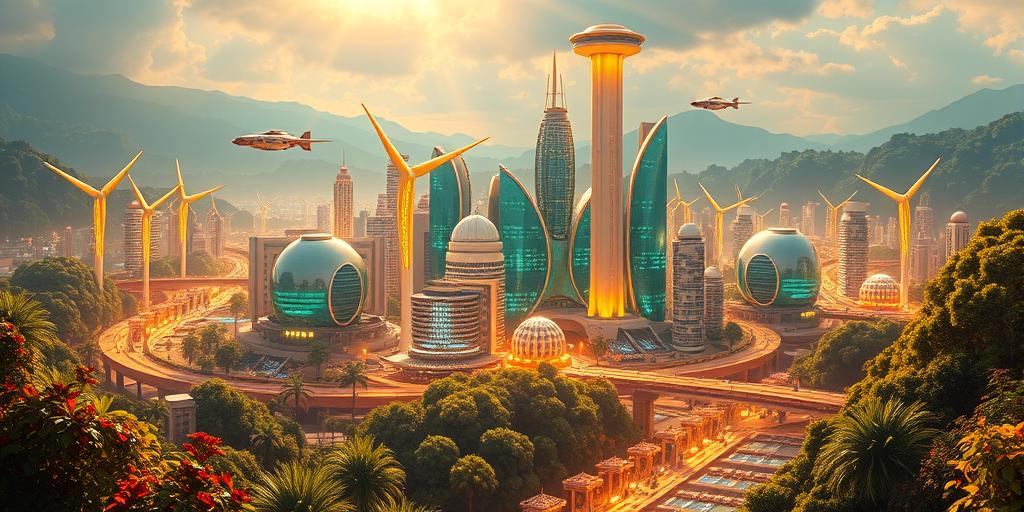Are you ready to witness the extraordinary potential of artificial intelligence in revolutionizing our planet? Prepare to be amazed as we delve into the groundbreaking ways AI is shaping a sustainable future, from combating climate change to optimizing resource management. This isn’t just about technology; it’s about securing a livable world for generations to come. Let’s explore the incredible impact of AI on our path towards a greener, more sustainable tomorrow.
AI-Powered Climate Change Mitigation: A Technological Leap Forward
Climate change is arguably the most pressing challenge of our time, and AI is emerging as a powerful ally in our fight against it. Advanced algorithms can analyze massive datasets of climate information – temperature readings, pollution levels, weather patterns – to identify trends and predict future scenarios with unprecedented accuracy. This predictive power enables proactive measures such as optimizing energy grids, improving weather forecasting, and implementing early warning systems for natural disasters. The potential for improved disaster response alone is transformative, minimizing damage and loss of life. Moreover, AI is not just helping us understand climate change; it’s assisting in developing innovative solutions. For example, AI-powered systems are optimizing renewable energy sources like solar and wind power, ensuring more consistent energy production and reducing reliance on fossil fuels. The development of AI-driven smart grids represents a monumental step in reducing carbon emissions and building a more resilient energy infrastructure. We’re no longer just reacting to climate change; we’re actively shaping a better future with the aid of AI.
Predicting Extreme Weather Events: Saving Lives and Resources
Predicting extreme weather events like hurricanes, floods, and droughts is crucial for effective disaster preparedness and mitigation. AI algorithms, trained on vast amounts of historical weather data, can analyze various factors and provide timely warnings, giving communities valuable time to evacuate, secure critical infrastructure, and prepare for the impact. This precision forecasting significantly reduces the human and economic toll of extreme weather, creating a more resilient and sustainable society.
Optimizing Renewable Energy Sources: Harnessing the Power of Nature
The shift toward renewable energy sources is vital for a sustainable future. AI plays a crucial role in optimizing these sources, improving efficiency, and reducing costs. AI algorithms can analyze real-time data from solar panels, wind turbines, and other renewable energy systems to predict energy output, ensuring a stable and reliable energy supply. This optimization reduces energy waste, minimizes the need for backup power sources, and increases the overall efficiency and sustainability of our energy systems. Furthermore, AI is helping to develop novel renewable energy technologies, such as improved battery storage and more efficient energy conversion systems. With continued research and development in this area, the future of clean energy looks incredibly bright.
AI’s Role in Sustainable Resource Management
Our planet’s resources are finite, making responsible resource management critical for long-term sustainability. AI offers a range of tools to optimize resource allocation and minimize waste. By analyzing consumption patterns, supply chains, and other relevant data, AI can help us create more efficient, circular economies. This includes optimizing logistics, reducing waste in manufacturing, and promoting sustainable consumption habits. Moreover, AI-powered precision agriculture is revolutionizing food production, increasing yield while reducing resource consumption such as water and fertilizer. It’s a win-win for farmers and the planet.
Precision Agriculture: Maximizing Yields, Minimizing Waste
AI-powered systems are revolutionizing agriculture, enabling farmers to optimize resource allocation and improve crop yields. By analyzing soil conditions, weather patterns, and crop health, AI algorithms can guide farmers in making informed decisions about irrigation, fertilization, and pest control. This precision agriculture approach significantly reduces waste, conserves resources, and boosts agricultural productivity, resulting in increased food security and reduced environmental impact.
Supply Chain Optimization: Reducing Waste and Emissions
AI’s ability to optimize complex systems makes it a game-changer for supply chain management. By analyzing data from different stages of the supply chain, AI can identify bottlenecks, inefficiencies, and potential disruptions. This allows businesses to optimize logistics, reduce transportation costs, minimize waste, and reduce the carbon footprint of their operations. The environmental benefits of optimized supply chains are substantial, paving the way for more sustainable business practices.
AI-Driven Solutions for a Greener Tomorrow: The Future is Now
The integration of AI into various sectors is driving innovative solutions for environmental sustainability. From smart cities that optimize energy consumption to AI-powered recycling systems that improve waste management, the applications are vast and ever-evolving. AI’s potential in developing sustainable materials and reducing pollution is remarkable, offering a pathway to more sustainable production and consumption patterns. These technological advancements offer promising solutions, shaping a future where economic progress and environmental protection go hand in hand.
Smart Cities: Sustainable Urban Living
The growth of smart cities leverages AI and IoT technologies to create urban environments that are environmentally sustainable and efficient. AI algorithms analyze data from various sources, like traffic flow, energy usage, and waste generation, to optimize resource allocation, reduce traffic congestion, improve public transportation, and decrease pollution levels. These smart city initiatives directly improve quality of life while contributing significantly to environmental sustainability.
AI in Waste Management: Recycling Revolution
AI is transforming waste management through advanced sorting systems, optimizing waste collection routes, and improving recycling efficiency. By identifying different types of waste and optimizing the recycling process, AI-powered systems reduce landfill waste and help create a circular economy. The combined effect of these innovations is a more responsible management of resources and a reduction in the overall environmental footprint.
Embrace the change! The future of sustainability is bright and it’s powered by AI. By leveraging AI’s capabilities, we’re not just mitigating the damage; we’re actively building a sustainable future. Let’s work together to make this vision a reality! Discover more ways AI is improving our world and join the movement towards a sustainable future!

